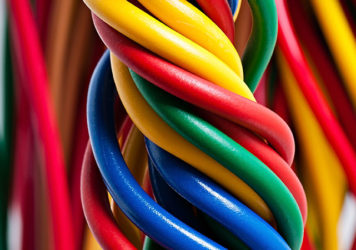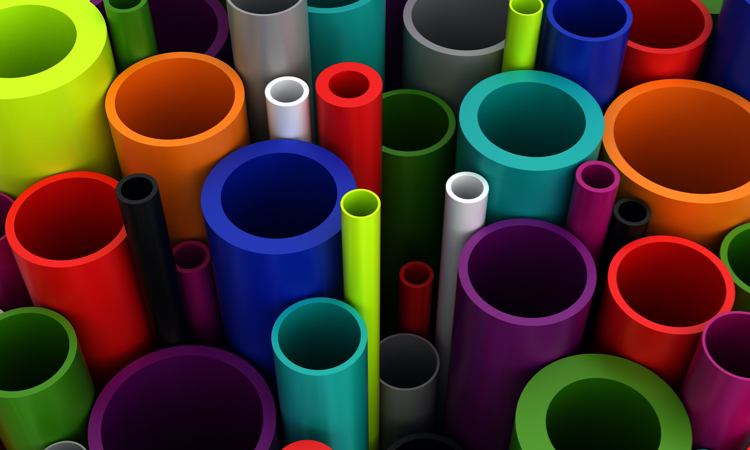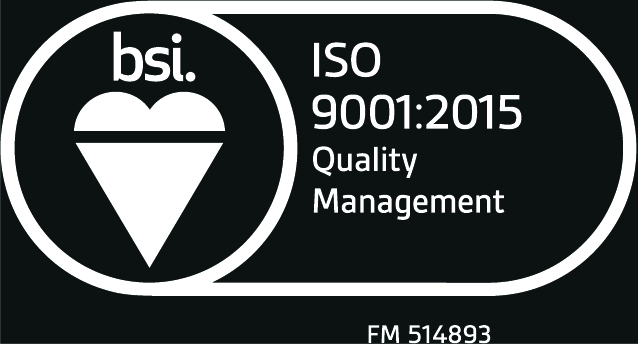
Applications That Polycarbonate is Used For
Created by an array of carbon-oxygen double bonds, polycarbonate possesses many material properties that make it useful for a wide variety of applications. From its high optical transparency to its thermal resilience, this plastic proves superior to its counterparts — such as polymethyl methacrylate (PMMA) — in several ways. We’re sharing what this diverse material can do for your industry?
Polycarbonate Structure and Properties
Derived by a reaction between bisphenol A (BPA) and phosgene, polycarbonate is a resinous polymer containing ester carbonate bonds. These O–C=O–O bonds give the material its rigidity and are responsible for many other helpful properties. Here are a few specific polycarbonate material properties that make it so helpful:
- Melt temperature: 288–316 °C (550–600 °F)
- Typical mold temperature: 82–121 °C (180–250 °F)
- Heat deflection temperature (HDT): 140 °C (284 °F) at 0.46 MPa (66 PSI)
- Tensile strength: 59 MPa (8500 PSI)
- Flexural strength: 93 MPa (13500 PSI)
- Specific gravity: 1.19
- Shrink rate: 0.6–0.9% (0.006–0.009 in/in)
It has many more beneficial properties, and you’ll find out why it’s a go-to plastic in so many industries.
Polycarbonate Applications
Each material property makes polycarbonate useful for certain applications. Since the material has so much to offer, it’s relied on for quite a lot. We’ve shared how each property makes it useful for its given application.
Transparency
Arguably the most beneficial property of polycarbonate is its high degree of transparency. Possessing superior optical properties like transmittance of up to 90% and a refractive index of 1.58, polycarbonate allows a great deal of light to pass through it, making it ideal for applications where transparency is a must. Some of these may include:
- Electric sign covers
- Glasses
- Lenses
- Visors
- Windows
In some lighting applications, it may be necessary to filter certain wavelengths of light. Some examples may include tinted windows, colored light fixtures, or even some helmets or visors. Polycarbonate is highly compatible with these applications, as extra ingredients may easily be added into this thermoplastic during fabrication to help it filter out unwanted wavelengths. Polycarbonate can even be designed to provide 100% filtration of UV rays.
Thermal or Electrical
Another highly valuable benefit of polycarbonate is its endurance under thermal and electrical strain. Instead of burning under high temperatures, polycarbonate gradually melts from a solid into a liquid. This steady transition occurs at a relatively high operating temperature of 239 °F ( 115° C). Like other plastics, polycarbonate also has excellent thermal and electrical resistance, which makes it a perfect choice for components in need of an insulator. Some applications that benefit from the thermal and electrical properties of polycarbonate are:
- CDs and DVDs
- Electronic components
- Insulators
- Medical devices
- Wire jackets
Because polycarbonate can handle the heat, the thermoplastic is perfect for so many applications.
Workability
Being a thermoplastic, polycarbonate can be formed and reformed as it is heated with minimal degradation of its material properties. That means it can stand up under relatively high heat, and even be remolded if necessary.
Its resilience under strenuous thermal conditions is what makes polycarbonate a prime candidate for many injection molding applications. In this manufacturing method, molten thermoplastics are forced into a mold and then cooled to set them in the shape in which they were cast. Polycarbonate also lends itself well to extrusion molding applications, where the heated resin is forced through a die to produce an elongated shape such as a tube or pipe. Some applications that benefit from the high degree of workability that polycarbonate offers are:
- Aircraft components
- Automotive components
- Capillary tubing
- Custom extrusions
- Plastic pipes and tubing
- Plastic profile manufacturing
Whether it’s by extrusion molding, injection molding, or some other method, the reversibility and workability of a thermoplastic like polycarbonate make it an excellent choice for manufacturing customer plastic profiles.
Strength
Polycarbonate is also known for its high degree of mechanical strength. This makes it a good material for use in impact-resistant applications like helmets or durable plastics, but it has other surprising applications:
- Bulletproof glass: By forming a series of sheets into a single unit, polycarbonate can be used to fabricate bulletproof glass to protect prison cells, bank tellers, and more. Coupled with its high transparency, the mechanical strength of polycarbonate makes it ideal for protecting what matters most.
- Building materials: From canopies and roof domes to roofing materials in sports stadiums, durable polycarbonate sheets provide enough strength to be used in the construction industry
- Sustainable materials: Its combination of transparency and enough durability to withstand hurricane-blown debris makes polycarbonate an alternative to glass in sustainable building technology, as it lets light in better than many acrylics without sacrificing strength.
Whether it’s endurance in construction or safety under fire, the mechanical properties of polycarbonate help it stand up under loads that other plastics couldn’t hold.
Inplex Is Your Polycarbonate Plastic Provider
Our team of engineers and plastics experts are well-experienced in handling many kinds of resins, and polycarbonate is one of our specialties. We use our expertise to design your custom plastic profiles with extrusion molding, injection molding, or any other number of plastic manufacturing processes. Find out how we can help your project come to life, by contacting us.
Back to Blog


